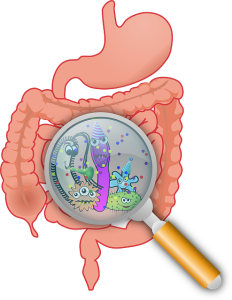
What you eat could be causing your digestive and stomach symptoms.
 As a nation, we spend $10 billion dollars a year on heartburn/acid reflux medicine such as Nexium and Pepcid AC (NPR, Healthinc, May 2015). Sixty million people have some form of IBS/Irritable Bowel Syndrome, while more than 5 million people suffer from daily constipation, resulting in 2 million doctor visits and $725 million a year for laxatives, anti-spasm meds and fiber supplements such as Metamucil (Gastroenterology Association). These remedies often have a yo-yo effect (days of constipation followed by days of diarrhea) and cause other side effects. And every day, millions of Americans complain of gas, feeling bloated, and/or ongoing stomach upset (Washington School of Medicine). Why all the tummy troubles?
As a nation, we spend $10 billion dollars a year on heartburn/acid reflux medicine such as Nexium and Pepcid AC (NPR, Healthinc, May 2015). Sixty million people have some form of IBS/Irritable Bowel Syndrome, while more than 5 million people suffer from daily constipation, resulting in 2 million doctor visits and $725 million a year for laxatives, anti-spasm meds and fiber supplements such as Metamucil (Gastroenterology Association). These remedies often have a yo-yo effect (days of constipation followed by days of diarrhea) and cause other side effects. And every day, millions of Americans complain of gas, feeling bloated, and/or ongoing stomach upset (Washington School of Medicine). Why all the tummy troubles?
I have learned from dozens of studies, research articles, and my own professional practice, that lifestyle, food choices and daily habits often cause these stomach symptoms. I’ve worked with may clients to help them understand what is causing their gut reactions. Improving digestion and stomach functioning is a huge part of what I do, and it is extremely rewarding because it affects so many of the symptoms that my clients experience. Here are some of the areas we cover:
• What’s going on in your gut? The lining of your small intestine is comprised of trillions of bacteria that coexist in a complex balance that keeps you healthy. Bacteria in our gut are also known as our micro biome. These trillions of bacteria break down food, protect us from disease, and keep us functioning optimally. But things like antibiotics, some over-the-counter medications, food additives, and food sensitivities upset the balance of good bacteria to bad bacteria. When the micro biome gets out of balance, your stomach reacts with gas, bloating, constipation, and/or diarrhea.
• An imbalanced gut could cause “leaking.” Many health coaches and nutritionists are aware of “leaky gut syndrome” – although your doctor may not be. Leaky gut is a result of damage to the intestinal lining. How does this happen? The naturally-occurring bacteria may overgrow; your stomach may not completely digest your food; and natural waste that would typically be absorbed may “leak” from your digestive system into your blood stream. Like the lactose-and gluten-intolerances discussed below, a leaky gut causes an autoimmune response, and that can cause gas, bloating and pain, as well as skin rashes, joint pain and exhaustion. Note that medications used for joint aches and body pains, as well as antibiotics, can cause chronic inflammation, which many experts believe can lead to leaky gut.
• Stress can have you running to the bathroom. When we’re stressed, our body produces hormones and chemicals such as cortisol and adrenaline. These can cause an overproduction of stomach acid, causing acid reflux or GERD (gastroesophageal reflux disease) — a chronic digestive disease that occurs when stomach acid flows into the esophagus, causing burning. Some foods such as tomato sauce, as well as alcohol and caffeine can aggravate symptoms. Focusing on relaxation techniques such as yoga, meditation and breathing exercises can help reduce stress and anxiety. These exercises may actually alter the brain’s neuro pathways, helping you become more resilient to the affects of stress.
Deep breathing – one breath in to the count of five; hold; then release to a count of seven – slows that rapid heart rate caused by anxiety or stress. There are many actions you can take to help reduce your stress; but the first step is to identify what’s causing the stress. As a health coach, I often recommend that clients jot down a few notes at the end of each day about their stress level, triggers, and how they feel they are coping.
•Your bowels are irritable. About 20 percent of all women suffer from IBS, which can cause gas, bloating and painful yo-yo-ing between diarrhea and constipation. Diet and stress can both contribute to IBS symptoms. A study by Dr. Mark Hyman found that changing certain foods in your diet can eliminate 30 percent of your symptoms. As a health coach, I help you identify which foods to eliminate, which foods are not problems, and guide you through an effective process for maintaining your healthier lifestyle. For example, while caffeine may increase IBS, you may need to wean yourself off of coffee or Diet Coke and learn healthier alternatives that still allow you the joys of a morning ritual.

My first suggestion to clients with IBS is to keep a food journal – you can start doing this now! Write down everything you eat, making sure to mark the time, amount, ingredients, and/or brand. This is a great investigative tool and helps us become more aware of what we’re eating and how we feel afterwards.
• How’s your lactose tolerance? About 25 percent of Americans have trouble digesting lactose – the sugar found in milk, ice cream, and soft cheese (think pizza, Queso cheese dip and fettuccine.) Lactose intolerance causes gas and bloating, and often gets worse as we age. If you want to take a self-assessment, try eliminating all dairy from your diet for one to three weeks, and see if your symptoms improve. This is not always easy to do without an expert’s help, because dairy or whey products are often hiding in foods that we would never consider “milk products.”
• What does your weight have to do with it? People who are overweight are 50 percent more likely to suffer from GERD and/or heartburn, and are more susceptible to gallstones (causing pain in the upper right-side of your stomach). Excess weight puts more pressure on your stomach, which then puts pressure on the valve opening to your esophagus. Slimming down to a healthier weight can reduce and often eliminate your food-related heartburn and GERD.
• Could wheat be the culprit? More people are discovering their stomach distress is related to gluten intolerance; studies show about 20% of Americans are affected, with celiac disease often the diagnosis. Celiac disease and gluten intolerance create an autoimmune reaction; the body produces antibodies that attack the protective “villi” found in the small intestine. Villi are what help you absorb nutrients, so when they are compromised, you get cramping, bloating and nutrient-deficiency. If your parents or siblings suffer from celiac or gluten-intolerance, there’s a greater chance you might, too, as there is a strong genetic link. You can get a blood test to determine if you have celiac disease, but there is no current test to conclude if you are gluten-intolerant.
Becoming gluten-free helps millions of sufferers eliminate symptoms, but eliminating gluten can be tricky and is best done with the help of a health coach who can help you learn more about the foods you can and cannot eat. Foods you’d never think would contain gluten often do – such as soy sauce and ketchup! Plus, to truly reap the benefits, gluten-free is an all-or-nothing diet – simply “reducing” your gluten intake often will not eliminate your symptoms.
If you have experienced stomach issues for years, or if your distress is recent, I would be happy to help you feel better and healthier! Schedule a Discovery Session appointment that’s all about YOU!

Leave a Reply